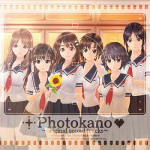Photokano Original Soundtrack
 |
Album Title: Photokano Original Soundtrack |
| Record Label: Two Five Records |
|
| Catalog No.: TRCD-10108/9 |
|
| Release Date: February 10, 2012 |
|
| Purchase: Buy at CDJapan |
Overview
Between his high-profile works on courtroom dramas and RPGs, Noriyuki Iwadare has scored plenty of dating simulators over the years. While his scores for the True Love Story series were mediocre, his more recent scores for True Fortune and Amagami were beautiful. He completed his work on another such title, Photokano, in 2012 and released the soundtrack as a two disc set. Does the music reach the same heights as his previous bishoujo scores? For the most part, it doesn’t…
Body
Photokano largely shifts away from the subtle approaches of Amagami‘s soundtrack in favour of bolder, simpler sound. “School Life”, for instance, captures the happy-go-lucky mood of the game with its light jazz-tinged melodies and synthy palette. While likeable enough, it’s too close to the typical bishoujo sound to particularly inspire listeners. In fact, the piece resembles many on the True Love Story series, albeit with more polished performances and samples. Iwadare doesn’t stray far from this format elsewhere on the soundtrack. “Unexpected Error”, “Happy & Lucky”, or “Usa Power Choice” are further examples of his straightforward approach. They’re all competent, fitting tracks, but absolutely starved of depth or creativity. The three part photo session suite further exemplify Iwadare’s clichéd approaches. “Happy” sounds like yet more muzak with its bland setup and predictable progressions. In contrast, “Exciting” and “Erotic” sound utterly contived with their romantic violin overlays: they’re used, after all, for scenes where the titular character takes gratuituous shots of his girlfriends!
Character themes are even more dominant on the Photokano soundtrack than Iwadare’s previous dating sim soundtracks. He created 14 such tracks — all presented in succession — and all but the last few adhere to the same punchy, jazzy approach as the rest of the soundtrack. The composer often succeeds in producing hummable melodies, most notably with the tunes dedicated to Haruka Niimi and Misa Kitagawa. He also occasionally emphasises the different qualities of the girls; for instance, the heavy saxophone-driven jam dedicated to Nonoka Masaki seems fitting for an outgoing sporty character, whereas the introspective piano arrangement for Tomoe Misumi captures a reclusive bookworm. However, most tracks sound like stock music and fail to distinguish the characters during the game; it’s quite difficult to tell apart Hikari Sanehara and Momoko Otani from their themes, for instance, never mind capture their moods. What’s more, after offering diverse moods and styles used in True Fortune and Amagami, this high-throughput approach ensures Photokano is a depressingly uniform stand-alone experience.
A few tracks nevertheless testify to Iwadare’s magic. The title theme, for instance, is much deeper than the rest of the material on the rest of the soundtrack. This soft arrangement for piano and strings certainly tugs at the heartstrings, but also has a certain innocence about it. The guitar-based “Memories of the Past”, electric piano-driven “Afternoon Rain”, and orchestrated “Confession” achieve similar feelings with their respective arrangements. The latter, especially, feels quite special in the scene it’s used in despite its cheesy tendencies. Several tracks of the more classically-oriented tracks are also charming, such as “Calm Afternoon” and “Falling in Love”. They bring some much-needed sophistication to the soundtrack and also have a nostalgic factor. There are also several jubilant vocal themes featured on the release, “Ahoge Appi no Uta”, “Love Love True Love”, and “Moonlight Starlight”. Featuring hyperactive seiyuus and pop-flavoured instrumentals, they’re bound to be select tastes. The second and third of these songs are only featured in multiple short versions on the soundtrack.
Summary
While there are some pleasant tracks on Photokano, the majority of the release is uninteresting. Iwadare adhered far too much to his superficial approaches to writing character and mood themes, using jazz stylings of the trashiest kind and melodies that are utterly predictable. As a result, few tracks inspire major emotions in listeners and even fewer are creatively inspiring. Nothing here challenges the stereotypes associated with dating sim music. Unless you enjoyed the music in the game, it’s better to skip this soundtrack in favour of Iwadare’s other recent bishoujo releases.
Do you agree with the review and score? Let us know in the comments below!
2.5
Posted on August 1, 2012 by Chris Greening. Last modified on August 1, 2012.














